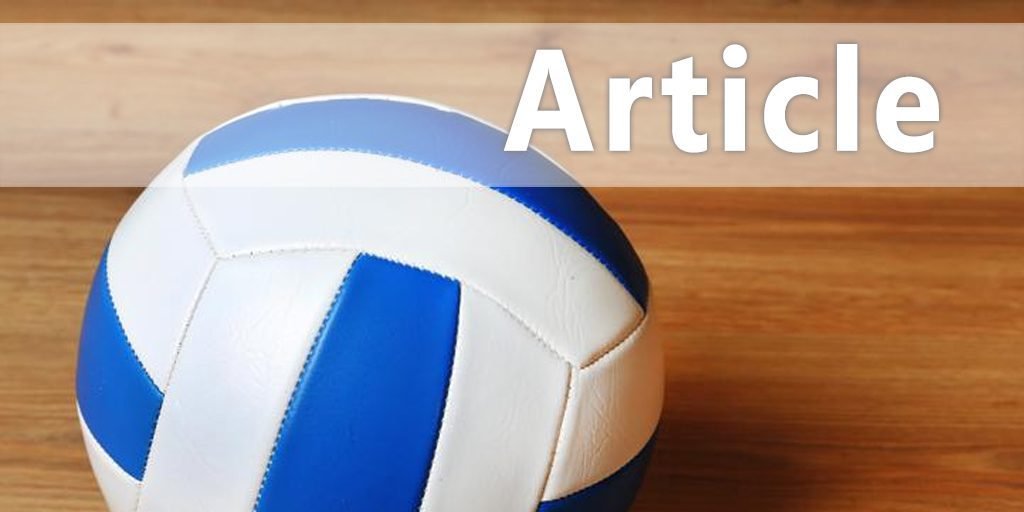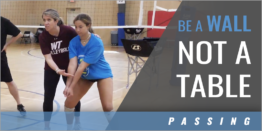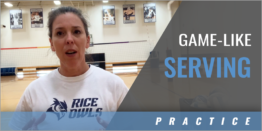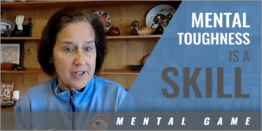|
By: Becky Schmidt - Head Volleyball Coach at Hope College in Holland, Michigan.
Talent and skills...there are differences between the two. Talent is a thing that just comes naturally; it's a thing that an individual was just born to do. Skills are things that an individual needs to work on and develop. Leadership is a skill. Leadership is something that you develop, and you use those skills daily in order to try to continue to improve your ability to influence the behaviors of other people. Todd Duncan with the Duncan Leadership Group has a quote that capsulate this: "Leadership takes a lifetime to achieve, and the pursuit is where the growth is. Too many people try to become a leader in a day, instead of leading daily." This mentality is one we tend to have when we, as coaches, do things like select captains. We think that captains have to have these leadership intangibles...that they have to be talented leaders already. Then we just let them go, and let them lead, but don't do anything to develop their skills. This is something that we are really trying to focus on in our program at Hope College...developing those leadership skills in student athletes. So, what have we, in our program, done? We've organized team captains' leadership workshops. We've done team captains' retreats, where we've gone away with our captains for a weekend to somewhere like a cabin or the beach. We've organized team retreats where the whole team will go someplace and do fun activities together, but also we also incorporate leadership development and team building into the weekend. We've also done an athletic department retreat, which has really been exciting. Half of our athletic programs will select two or three student-athletes to go with the head coach to a ranch in Montana for about four days. The time at the ranch has been donated by a college donor, and the college's president will pay the travel expenditures. I realize that we are really blessed to have this opportunity and I recognize that this is something that is not accessible to a lot of programs out there. The idea behind is it, however, is something that IS accessible: Getting your teams together, and not just thinking about it as YOUR team, but as the team of your athletic department. Creating accountability of the whole department is something that can help your team move forward. In my program, our team captains' leadership workshops normally take place on the front porch of my house. It provides a more laid-back atmosphere where in the summertime we get together once a week, pour out some lemonade and have a discussion. Our team captains retreats have seen our captains go on things like hikes...just doing things where they are spending time together away from the game of volleyball and learning and understanding each other's perspectives, personalities, etc. Our team retreat this past season saw us head to the beach of Lake Michigan for one day. We spent some time at a campground, had a fire, went through some team-building activities and talked about some of our goals for the season. The first thing I encourage you to do when planning any one of these kinds of retreats is to check the rules. In NCAA Division III we have a lot of rules that say what you can and cannot do out of season. Before you go and get involved with anything like this, make sure there is not a rule prohibiting something you are planning. For instance, we are not allowed to have any "chalk talk" with our student-athletes out of season. We are prohibited from talking about the game of volleyball out of season, according to NCAA rules. So, how do you avoid that when you are talking with your team captains about leadership on your team? We talk with our captains about general kinds of ways to be leaders, we use examples from other sports, but we are careful not to directly address the game of volleyball. What do you hope to accomplish from doing a leadership development program? It's important to go about it with a plan; to have a plan of attack. Our program put together a few things we wanted to accomplish: to educate about leadership, to develop trust between our captains, to get our student-athletes to have a vision and to prepare for obstacles. The important result of leadership development and conducting these meetings and retreats, is that the student-athletes appreciate and understand my perspective a little more. They understand where I am coming from. They appreciate that this is not something I do three months out of the year, but that this is something I think about daily. They appreciate the investment that I've made into the program, and they are more willing to support that vision to the team. It gets them to buy-in to the program. It also helps me to appreciate their perspective. I understand more where they are coming from, and they are able to feel that they can trust and communicate with me. Leadership development also strengthens relationships. Coaching is all about relationship building. If you spend all of this time investing in the people you are working with, those relationships are going to grow, and you are going to continue moving forward. If you are going to have a leadership retreat, a workshop or a seminar, what do you do? Start having team captains' meetings. We do this on the bus when we are travelling on road trips. I feel that our student-athletes are stressed enough that they don't need to schedule another time to come into my office, so it makes it a lot easier. During the off-season, discuss readings, books or guides you might want your team to look over. We brainstorm. If presented with a situation, what are all of the different ways we could handle it? Brainstorming has been a great technique for at least getting the team to think of all of the different options that are there. Kids, a lot of times, tend to go with the first idea that comes to mind, instead of thinking of all the options, no matter how crazy they may be. Anonymous feedback is my new, favorite technique for getting to the bottom of things. What does the team think about certain situations? To encourage anonymous feedback, take a card and write a statement or situation on one side. Using a scale of one-to-five, with five being "very true" and one being "not at all true", have each student-athlete write their ranking number of choice on the back of the card with the statement, flip the card back over so that the statement on the card is showing, and pass it to another member of the team, who will then follow the same procedure. The key thing here is to advise your student-athletes not to sway their opinion, despite what the other numbers on the card are. You can then take the card and have a great team discussion about the card and the anonymous answers listed on it. Another activity we do with our captains is create a "teammate needs journal." We go around the team and write down things that we think each member of the team needs in order to be successful. When you start this project, the captains have no clue what each teammate needs. This project stresses to the captains the importance of the "little" information they need to know about their teammates and allows them to move forward and learn from their own personal experiences. We help our captains to understand a vision and having a crystal-clear idea of what we are working towards. In your weekly captains' meetings, discuss your visions and goals of the team, and how we are doing in working towards these. Finally, one of the things we like to do is evaluate. Evaluations are, basically, like my idea of a scoreboard. AVCA Executive Director Kathy DeBoer had commented in a previous edition of Coaching Volleyball, that the scoreboard is not to tell you whether or not you are successful, it's to tell you what you need to be doing next. I look at evaluations as a kind of scoreboard on leadership. What do evaluations give you? Evaluations give you concrete data. You can track progress. Are your players' scores changing over time? It's also a way to track needs and a tool for exploration. I have my captains fill out evaluations about each other, which also prove to be good discussion-builders as well. Some of these meetings and discussions can be uncomfortable, because I do like to show each player their evaluation. However, it gives each individual something concrete to go by and things to work for. If you are thinking of putting together a leadership retreat or workshops, here are ten pieces of advice to help you plan:
The strategies and advice given here is intended to help coaches take a systematic approach to enhancing the leadership skills of your team members with influence. By engaging your leaders through workshops, conversations, evaluations and retreats, you can prepare your captains for the responsibility of leadership and enhance your communication effectiveness in the process.
About the Author... NOTE: This following information reflects details available at the time of writing and may have since changed. Rebecca (Becky) Schmidt (schmidt@hope.edu) made her mark on Hope volleyball as a student-athlete and is now doing it as coach of the Flying Dutch program for seven seasons. The 2010 Flying Dutch won more than 20 matches for the sixth consecutive season en route to winning a Michigan Intercollegiate Athletic Association (MIAA) co-championship, the fourth under coach Schmidt. The 2009 Flying Dutch captured the NCAA Division III Great Lakes Regional championship and advanced to the final four at the national championships, both firsts for Hope volleyball. Twice she has guided the Flying Dutch thru undefeated (16-0) MIAA seasons (2005 and 2009). The 2010 MIAA cochampions were also 16-0 in conference matches. The 2009 team had a 34-4 mark, a school record for victories. Schmidt's seven-year Hope record thru the 2010 season is 181-67 (.730). Her collegiate coaching record, which includes three seasons at the University of Redlands, Calif., is 220-98 (.692). Schmidt coached her 100th Hope victory on Sept. 6, 2008 when the Flying Dutch defeated Olivet. Her Hope record at that time was 100-52. In November, 2008 she was elected the NCAA Division III representative to the Board of Directors of the American Volleyball Coaches Association (AVCA). A 1999 Hope graduate, Schmidt played middle blocker and ranked among the NCAA leaders in several statistical categories. She was voted the most valuable player in the Michigan Intercollegiate Athletic Association (MIAA) as both a junior and senior. As a senior she became the first Hope volleyball player to receive NCAA Division III All-American honors. She was also awarded an NCAA Postgraduate Scholarship. A kinesiology major, she received departmental recognitions for her academic work. Her senior year she was presented the John Schouten Award as the college's outstanding female student-athlete. After graduating from Hope she was a graduate assistant volleyball coach at Miami University of Ohio while completing her master's degree in Sport Behavior and Performance. Prior to returning to her alma mater, she was head coach at the University of Redlands, Calif., compiling a 38-33 record in three seasons at the NCAA Division III institution. She has also coached volleyball club teams in Michigan, Ohio and California. In California she has coached the Redlands Dragons 18s team and helped establish a volleyball development program for 12-year-olds. In 2002 she coached a USA Athlete's International volleyball team to a gold medal in the "Down Under Games" in Australia. Schmidt is a 1994 graduate of Holland High School. While at Hope she was involved in the Holland community, volunteering with the Boys and Girls Club and Habitat for Humanity. She has continued her involvement with Habitat for Humanity in California.
|






